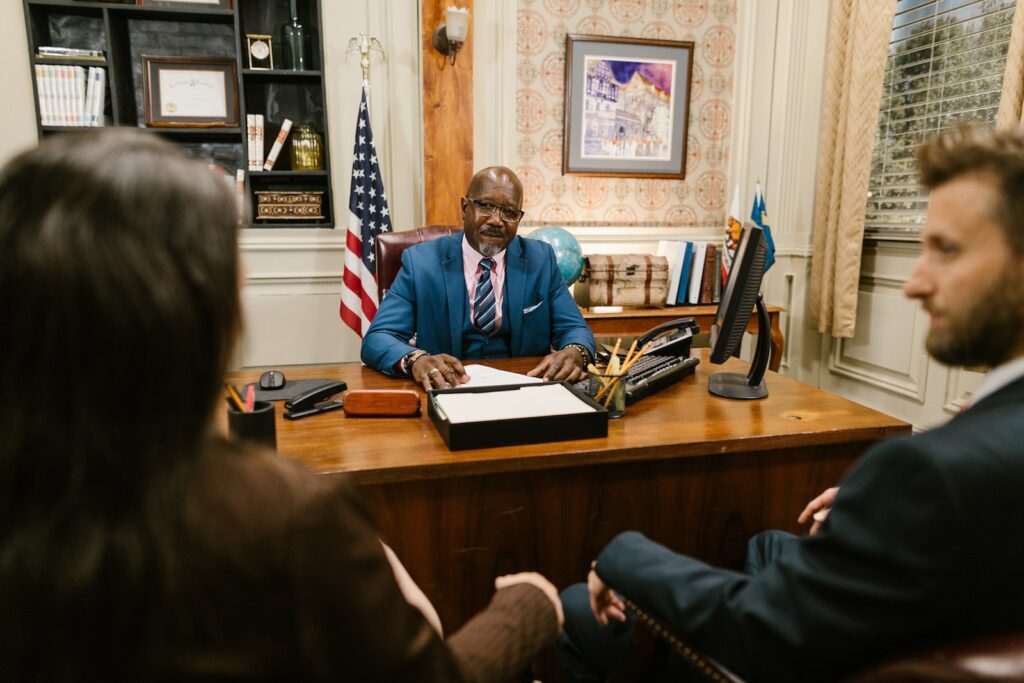
Consulting with a lawyer can be an essential step in addressing a legal issue or dispute. Selecting the right attorney and understanding the consultation process are crucial factors that can influence the outcome of your case. From finding a lawyer with expertise in your specific area of law to knowing the right questions to ask during the consultation, being prepared can make a significant difference.
The lawyer consultation is not only an opportunity for you to assess the attorney’s ability and willingness to handle your case, but it also serves as a chance to discuss your legal options and prospects of success. It’s essential to be forthcoming with information about your case and ask about the attorney’s fees during the consultation to ensure that there are no surprises later on.
Key Takeaways
- Choose a lawyer with expertise in your specific area of law
- Be prepared to discuss your case and legal options during the consultation
- Inquire about fees and payment options to avoid surprises later on
Finding the Right Lawyer
When seeking legal advice or representation, it’s essential to find a lawyer who has the necessary skills, experience, and knowledge to handle your specific situation. Here are some factors to consider to select the right lawyer for your needs.
Choosing a Specialty
Lawyers often focus on specific areas of law, such as divorce, medical malpractice, or intellectual property. It’s crucial to find an attorney who specializes in the area most relevant to your needs. For example, if you need help with a divorce, you should look for a lawyer experienced in family law.
Years of Experience
While a newly qualified lawyer might have the necessary legal knowledge, an experienced attorney will likely have a better understanding of the nuances of the law and how it applies to your specific case. Consider how many years the lawyer has been practicing and if their experience aligns with your legal needs.
Reputation and Reviews
The reputation of a lawyer or a firm plays a significant role in the selection process. Look for reviews from previous clients to get an idea of the attorney’s competence and professionalism. Ask for recommendations from friends, family, or colleagues who have used the services of a lawyer in the past. Researching the lawyer’s background and success rate can also give you a better understanding of their capabilities and whether they would be a good fit for your case.
Preparing for the Consultation
During a consultation with a lawyer, it’s essential to be well-prepared in order to receive the best guidance and make the most of your time. In this section, we’ll cover the following sub-sections to help you prepare: Gathering Documents, Creating a List of Questions, and Taking Notes.
Gathering Documents
Before meeting with a lawyer, collect important documents related to your case. This may include:
- Medical records: In cases involving personal injury or medical malpractice, having your medical records can help the attorney understand the severity of your injuries and potentially identify signs of negligence.
- Police reports: In criminal or accident cases, police reports provide valuable information about the incident, including details of arrests, witness statements, and the presence of any evidence.
- Contracts and agreements: For civil disputes, having copies of any signed contracts or agreements can help the attorney understand the scope and terms of the involved legal relationships.
- Witness information: Names and contact information of any witnesses to the event in question may be crucial for building a strong case.
Creating a List of Questions
To ensure you obtain all necessary information during your consultation, prepare a list of questions beforehand. These may include:
- How much experience do you have with cases similar to mine?
- What is your estimated timeline for resolving this case?
- Are there any alternative dispute resolution options, such as mediation or arbitration, that we should consider?
- How will we communicate throughout the process, and how often can I expect updates?
- What are your fees, and is there any flexibility in the payment structure?
Taking Notes
During the consultation, it’s important to take notes in order to remember the lawyer’s advice, your discussions, and any tasks you’re responsible for. As you take notes, consider the following:
- Key advice: Write down the attorney’s recommendations, potential strategies, and any legal terms that need clarification.
- Action items: Note any tasks you’ll need to complete for your case, such as contacting witnesses or gathering additional documents.
- Follow-up questions: If certain topics require more information or research, make a note of relevant questions to ask during your next conversation with the attorney.
By preparing documents, creating a list of questions, and taking detailed notes, you’ll be better-equipped for a productive consultation with your lawyer.
During the Consultation
Discussing Your Case
During the initial consultation, the lawyer will ask questions to get a clear understanding of your situation and gather all relevant information. Be prepared to provide details about your case, including any applicable documents, names of parties involved, and any necessary background context. The attorney will use this information to assess your situation and determine the best course of action.
Evaluating Potential Outcomes
After discussing your case, the lawyer should be able to provide insight into the possible outcomes of your situation. While they cannot guarantee specific results, a knowledgeable attorney can present an evaluation of the strengths and weaknesses of your case. This analysis may help you decide whether to proceed with legal action or explore alternative solutions.
Understanding the Legal Process
During the consultation, the attorney will explain the legal process relevant to your case. They will give an overview of the steps involved and indicate how long it may take to resolve the matter, considering factors such as the complexity of your situation and potential procedural requirements. Awareness of the legal process will enable you to make informed decisions moving forward.
Assessing the Strategy
Finally, the lawyer will discuss the proposed strategy for your case. They will outline the legal methods they intend to employ and why they believe these strategies will lead to the most desirable outcome. This discussion helps you understand how the attorney plans to represent your interests in the legal system, allowing you to evaluate their approach before committing to their services.
In conclusion, a consultation with a lawyer provides an opportunity for open communication regarding your case, understanding the probable outcomes and the legal process, and assessing the attorney’s proposed strategy. This vital process empowers you with the information necessary to make informed decisions about your legal needs and representation.
Fees and Payment Options
When you consult with a lawyer, it is essential to understand the fees and payment options that can apply. This section elaborates on the different types of fees involved, such as consultation fees, hourly fees, retainer, and payment plans.
Consultation Fees
Some lawyers offer a free consultation, while others charge a consultation fee that ranges from $0 to $300 based on the specific legal field. During this consultation, the lawyer will typically assess the nature of your legal issue, discuss your options, and determine if they can assist you. It is crucial to ask your lawyer about the consultation fee and any other applicable fees during this meeting.
Hourly Fees
In some cases, lawyers charge an hourly fee for their services. The lawyer will track the time spent on your case and bill you accordingly. Hourly rates can vary significantly depending on factors such as experience, location, and type of law practiced. Make sure you discuss the hourly rate with your lawyer and inquire about the estimated number of hours your case may require.
Retainers
A retainer is an upfront payment made to the lawyer for their services. It is usually requested when the lawyer agrees to take on your case, and it will be held in a trust account. As your lawyer works on your case and accrues fees (such as hourly fees), these funds will be drawn from the retainer account. Retainers can be a useful way to manage the cost of legal services, as they provide a clear understanding of the initial financial commitment. Always discuss the retainer amount and its terms with your lawyer.
Payment Plans
Depending on your financial situation and the lawyer’s flexibility, you may be able to arrange a payment plan to manage the costs of your legal representation. Payment plans can involve smaller, regular payments instead of a sizeable upfront payment. Be sure to ask your lawyer if they offer payment plans and discuss the details, like interest rates and repayment terms, before moving forward with a plan.
Understanding the fees and payment options associated with working with a lawyer is essential, as it helps you manage costs and allows you to choose the best representation for your specific needs and financial situation. Stay proactive and ask questions, so there are no surprises as your case progresses.
Confidentiality and Privacy
Attorney-Client Privilege
Attorney-client privilege is a legal principle that protects communication between a lawyer and their client from disclosure during litigation or other proceedings. This privilege encourages clients to be open and honest with their attorneys, which helps promote effective representation1. It is important to understand that attorney-client privilege applies only when you have a formal attorney-client relationship. For example, if you are having an initial consultation with a lawyer, the privilege may not yet apply.
To ensure that attorney-client privilege is maintained, both the lawyer and the client must actively protect the confidentiality of their communication. This means not sharing the content of their discussions with third parties and taking necessary precautions when communicating electronically.
Handling Sensitive Information
In addition to attorney-client privilege, lawyers have a broader responsibility to maintain client confidentiality, which may include any information relating to a client’s case2. This encompasses sensitive personal details and financial data, as well as facts and evidence that are pertinent to the legal matter. As a client, you should expect your lawyer to take steps to secure your information and adhere to data privacy laws3.
During a consultation with a lawyer, it is advisable to limit the amount of sensitive information you share until the attorney confirms that they can take on your case4. This helps prevent potential conflicts of interest and ensures that your private information remains protected.
It is crucial to discuss confidentiality and privacy issues with your potential lawyer during the initial consultation. Be prepared to ask questions about their experience handling your type of case and how they plan to safeguard your information. Remember that establishing trust and understanding from the outset plays a crucial role in a successful attorney-client relationship.
Post-Consultation Steps
Evaluating the Consultation
After your initial consultation with a lawyer, take some time to evaluate the meeting. Consider how well the attorney listened to your concerns, whether they provided clear explanations of the legal process, and if they were able to offer potential solutions. Also, assess the rapport you had with the attorney and if you felt comfortable discussing your case with them. Don’t forget to take note of any expectations they set regarding legal fees.
Making a Decision on Hiring
Once you’ve evaluated the consultation, decide whether you want to hire the lawyer or continue searching for alternatives. Factors to consider may include the attorney’s experience, communication style, and fee structure. If you’re unsure, it’s okay to meet with multiple lawyers and compare their approaches and fees before making a choice. Some law firms may even offer free consultations to help you make an informed decision.
Gathering Additional Paperwork
After deciding to hire an attorney, gather any additional paperwork and documents necessary for your case. This may include contracts, correspondence, photos, videos, financial records, medical records, or any other relevant information. Organize your documents and make copies to provide to your attorney. This will help the lawyer gain a more thorough understanding of your case and work toward the best possible outcome.
Staying in Communication
Maintain open communication with your attorney throughout the legal process. Appoint a specific contact person within the law firm to handle your inquiries and updates. Regularly check in with your lawyer to stay informed about your case’s progress and to provide any new information that may arise. Keeping lines of communication open ensures that both you and your attorney are on the same page and can efficiently work together toward a resolution.
Handling Settlements and Procedures
When consulting with a lawyer, it’s important to discuss potential settlement options and understand court procedures. This section will cover the sub-topics of negotiating settlements and understanding court procedures.
Negotiating Settlements
During a consultation, your lawyer will help you evaluate the merits of your case and discuss possible settlement options. They will analyze the strengths and weaknesses of your case, as well as identify the risks associated with going to trial. Some key factors to consider while negotiating settlements include:
- Strength of your case: A stronger case increases the likelihood of a favorable settlement.
- Opposing party’s willingness to settle: Determine whether the opposing party is open to negotiating a settlement, or if they intend to pursue the matter in court.
- Monetary compensation: Discuss the potential monetary compensation you may receive, factoring in your damages and expenses.
Your lawyer will advise on the most suitable negotiation strategy and assist with drafting a settlement agreement if necessary.
Understanding Court Procedures
If you are unable to reach a settlement, your case might proceed to court. It’s crucial to understand the court procedures to navigate the legal process confidently. Some important aspects of court procedures include:
- Filing a complaint: Your lawyer will help you draft and file the complaint, which outlines your legal claims against the opposing party.
- Discovery: This is the process of exchanging information and evidence with the opposing party before the trial. Your lawyer will guide you through the various stages of discovery, including interrogatories, document production, and depositions.
- Motions: Your lawyer may file motions on your behalf during the course of litigation. These can include motions to dismiss, motions for summary judgment, or motions to suppress evidence.
- Trial: If your case goes to trial, your lawyer will represent you in court, presenting evidence, questioning witnesses, and making legal arguments.
By being well-prepared for your consultation, you can effectively communicate with your lawyer, evaluate settlement options, and understand court procedures, ultimately increasing your chances of a successful outcome.
Frequently Asked Questions
How much does it cost?
The cost of a consultation with a lawyer may vary depending on the attorney’s experience, location, and the complexity of your issue. Some lawyers offer free consultations, while others may charge a fixed fee or an hourly rate. It’s important to ask about all fees that apply during your first meeting.
What should I bring?
Bring any relevant documents, contracts, or correspondence that relate to your legal matter. These may include letters, emails, court documents, or even photographs. Organizing these materials and bringing copies can help create a more efficient consultation.
How long will it last?
Consultations can last anywhere from 30 minutes to over an hour, depending on the complexity of your case and the questions you have. It’s a good idea to have a list of questions prepared so you can make the most of your time with the lawyer.
How to prepare?
Preparing for a legal consultation involves having questions prepared and being ready to answer any questions the lawyer might ask. It’s important to answer honestly to give the lawyer an accurate picture of your case. Additionally, researching your legal issue and possible outcomes can help you understand what to expect.
What happens during the meeting?
During the meeting, the lawyer will typically ask about the nature of your legal issue, discuss your legal options, and determine whether they can assist you. They may also give you an idea of your prospects of success, and discuss the expected workload and costs associated with the case. This is your opportunity to ask questions and determine if this lawyer is the right fit for your needs.
Important questions to ask
Some key questions to ask during a consultation include the lawyer’s strategy and expected outcome for the case, and the estimated timeline for resolving the entire case. It’s also important to discuss the lawyer’s experience with similar cases and the legal strategies they intend to use.



